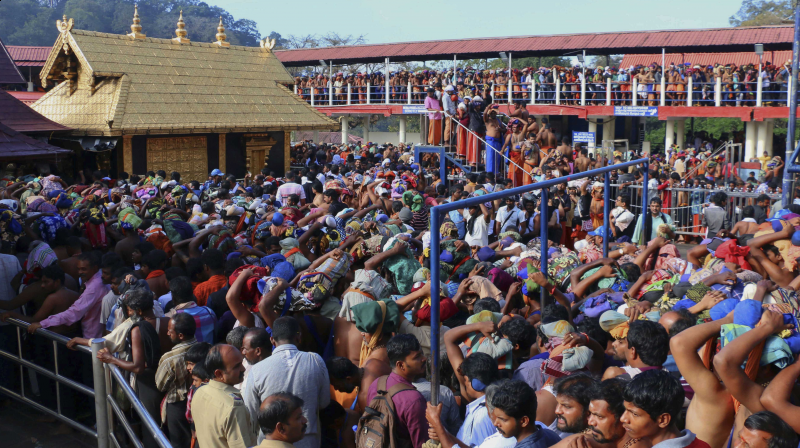DC Debate: Supreme Court on ban on women at Sabarimala

It’s judicial misadventure
The Supreme Court questioning the Travancore Devaswom Board on its right to refuse entry for women between the age of 10 and 50 into the sanctum sanctorum of the Sabarimala Sri Ayyappa Temple is seen as a judicial misadventure. It clearly transgresses into the centuries-old religious customs, rituals and rights of Hindu religion. The questions posed by the three-member judges’ bench also would be seen as bordering on judicial arrogance and a show of disrespect to the customs and beliefs of an ancient religion.
The Sabarimala Lord Ayyappa Temple is in existence for over 1500 years, centuries before the coming into being of this nation as the Republic of India. The ancient knowledge, norms and practices of a place of worship as ancient as this is not open to scrutiny and direction by the SC. Questioning religious customs on the basis of logic is tantamount to questioning the origins of its practice.
Seeking evidence for a religious custom being practised for centuries amounts to questioning the sheer existence of the same. It can also be considered as an insult to the religious doctrine of Hindus. Why should Hindus have to prove anything to anyone as related to their religious faith?
If questioning Islamic religious customs is considered blasphemous, how questioning of Hindu religious customs would not amount to blasphemy?
The Constitution provides for complete religious freedom. It also provides the freedom to citizens to practise a religion of individual choice, in the full letter and spirit of its customs and traditions, through the 42nd Amendment of the Constitution in 1976. The preamble to the Constitution asserted that India is a secular nation. True, in western democracies, parliament-enacted laws are above religious laws, and the state does not recognise any religion. Indian Constitution, however, recognises all religions to be equal and provides for individual religious laws to be above board. This subtle difference in the concept of secularism in India is worth serious note.
The Constitution does not explicitly define the relationship between religion and state. Nor does the Indian law. If the apex court can question ancient Hindu religious customs, rituals and traditions, it should have the spine to question other religions’ customs, rituals and traditions too. However, there’s no precedent of the apex court questioning the Muslim Law Board on many contentious issues pertaining to discrimination of women, like the issue of hijab, divorce or polygamy.
If the SC wishes to intervene and direct the religious practices of Hinduism, it must first ask Parliament to move an amendment to the Constitution, scrapping all religious boards and implementing a uniform civil code. In the present form, the Constitution does not allow the judiciary to interfere in religious customs and practices.
The order on Sabarimala is clearly out of the jurisdiction of the apex court.
Krishna Saagar Rao, The writer is a spokesperson of the BJP , an organisational strategist and author.
We must wait for final order
Justice Dipak Mishra of the Supreme Court asked: “Why can you not let a woman enter Sabarimala?” Justice Mishra is heading a full bench hearing a petition filed by the Indian Young Lawyers Association and five women lawyers, praying for a direction to allow the entry of women into the Lord Ayyappa temple in Kerala without any age restriction.
Off-bench remarks or questions are not conclusions, but steps in the process. The final judgement of the apex court depends on proof of custom and usage among several other factors.
The Constitution rejects discrimination on the basis of age, gender and caste. Except in the case of a private temple, entry cannot be restricted.
This restriction was imposed under Rule 3 (b) of the Kerala Hindu Places of Public Worship (Authorisation of Entry) Rules, 1965.
The Kerala High Court had upheld the ban in 1991 and directed the Devaswom Board to implement it. Petitioners challenged this in the apex court which issued notices 10 years ago.
Access to public places cannot be denied to individuals on any ground including gender. Article 15 of the Constitution prohibits discrimination on grounds of sex. It says: (1) The State shall not discriminate against any citizen on grounds only of religion, race, caste, sex, place of birth or any of them. (2) No citizen shall, on grounds only of religion, race, caste, sex, place of birth or any of them, be subject to any disability, liability, restriction or condition with regard to (a) access to shops, public restaurants, hotels and places of public entertainment; or (b) the use of wells, tanks, bathing ghats, roads and places of public resort maintained wholly or partly out of State funds or dedicated to the use of the general public. (3) Nothing in this article shall prevent the State from making any special provision for women and children. The Devaswom Board has stated that the prohibition was based on customs followed for the past half a century. As per the jurisprudence, the custom is considered ‘law’ if its practice is proven.
Customary practices and established usage reflect the consolidated consent of people over a long period. They form exceptions to written text of law.
The factual matrix is it's unique that the Ayyappa temple allows devotees into the most sacred Garbha Griha (sanctum sanctorum) with exceptions, while no other temple permits entry there; In Tirumala, all including VVIPs have to return from last threshold called Kulashekhar Padi before Lord Venkateshwara. No woman enters masjids even during Ramzan.
Purely religious matters are out of the jurisdiction of civil courts. Petitioners wanted the apex court to evolve guidelines in matters of gender inequality in religious practices at places of worship. Can courts issue such guidelines? Can the Executive or the Legislature interfere by framing “guidelines’ facilitating gender equality in masjids and Islamic religious or customary practices?
Madabhushi Sridhar, The writer is Central Information Comissioner, New Delhi.

